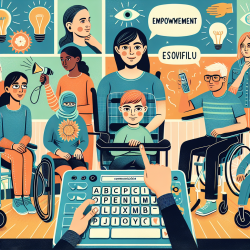Introduction
In the ever-evolving field of speech-language pathology, practitioners are increasingly turning to data-driven approaches to enhance therapy outcomes. A recent study titled "The burden is upon your shoulders to feed and take care of your children, not religion or culture" provides valuable insights into how participatory community dialogues can reshape community norms, offering lessons that can be translated into the realm of speech therapy. At TinyEYE, our commitment to leveraging online therapy services for schools aligns with these findings, emphasizing the importance of using evidence-based practices to foster better outcomes for children.
Understanding the Research
The study conducted in rural Uganda explored how community dialogues could promote family planning's holistic benefits and reshape community norms. By addressing deeply ingrained cultural and religious beliefs, the intervention successfully encouraged participants to reconsider traditional norms, leading to more equitable decision-making and improved family planning acceptance. These findings underscore the power of transformative communication in altering entrenched beliefs and behaviors.
Applying Research Insights to Speech Therapy
For speech-language pathologists, the study's outcomes highlight the importance of considering cultural and social contexts when designing interventions. Here are key takeaways for practitioners:
- Cultural Sensitivity: Just as the study addressed cultural norms around family planning, speech therapists must be attuned to the cultural backgrounds of the children they work with. Understanding family dynamics and cultural values can inform more personalized and effective therapy plans.
- Community Engagement: Engaging families and communities in the therapy process can enhance outcomes. By fostering open dialogues with parents and caregivers, therapists can better understand the child's environment and tailor interventions accordingly.
- Holistic Approach: The study's holistic view of family planning parallels the need for a comprehensive approach in speech therapy. Addressing not only speech and language skills but also social and emotional development can lead to more robust outcomes.
- Data-Driven Decisions: Utilizing data to track progress and adjust therapy plans is crucial. Just as the study used data to evaluate changes in community norms, speech therapists can use data to assess the effectiveness of interventions and make informed decisions.
Encouraging Further Research
The study encourages practitioners to continue exploring innovative methods to engage families and communities in the therapy process. Future research could focus on developing community-based interventions that incorporate cultural values and norms, thereby enhancing the acceptance and effectiveness of speech therapy programs.
Conclusion
Incorporating the insights from the Ugandan study into speech therapy practices can lead to more culturally sensitive, community-engaged, and data-driven approaches. By doing so, practitioners can improve outcomes for children, ensuring they receive the support they need to thrive. To read the original research paper, please follow this link: "The burden is upon your shoulders to feed and take care of your children, not religion or culture": qualitative evaluation of participatory community dialogues to promote family planning’s holistic benefits and reshape community norms on family success.










